
Journal Menu
► ▼ Journal Menu-
- Metabolites Home
- Aims & Scope
- Editorial Board
- Reviewer Board
- Topical Advisory Panel
- Instructions for Authors
- Special Issues
- Topics
- Sections & Collections
- Article Processing Charge
- Indexing & Archiving
- Editor’s Choice Articles
- Most Cited & Viewed
- Journal Statistics
- Journal History
- Journal Awards
- Conferences
- Editorial Office
Journal Browser
► ▼ Journal BrowserNeed Help?
Announcements
23 June 2025
Metabolites | Highly Cited Papers Published in 2023–2024 and Hot Topic Special Issues in the “Endocrinology and Clinical Metabolic Research” Section
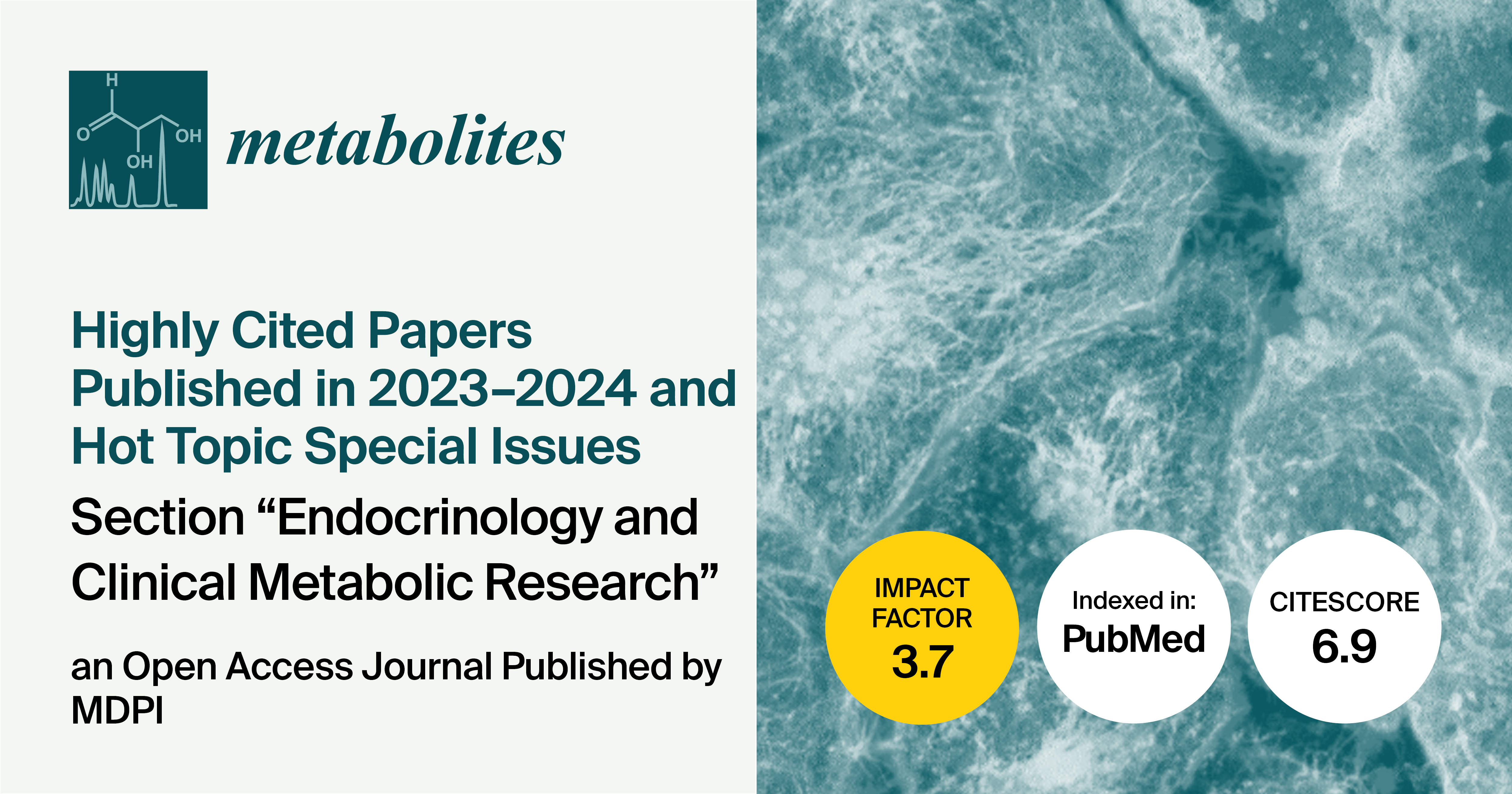
We are delighted to share some of the highly cited papers from the Section “Endocrinology and Clinical Metabolic Research” that were published in Metabolites (ISSN: 2218-1989) in 2023 and 2024. In addition, some Special Issues related to this topic are currently open for submission.
The following is a list of articles and Special Issues that we believe will be interest of you:
1. “Metabolic Signatures Elucidate the Effect of Body Mass Index on Type 2 Diabetes”
by Qiuling Dong, Sidra Sidra, Christian Gieger, Rui Wang-Sattler, Wolfgang Rathmann, Cornelia Prehn, Jerzy Adamski, Wolfgang Koenig, Annette Peters, Harald Grallert et al.
Metabolites 2023, 13(2), 227; https://doi.org/10.3390/metabo13020227
Available online: https://www.mdpi.com/2218-1989/13/2/227
2. “The Engagement of Cytochrome P450 Enzymes in Tryptophan Metabolism”
by Anna Haduch, Ewa Bromek, Wojciech Kuban and Władysława Anna Daniel
Metabolites 2023, 13(5), 629; https://doi.org/10.3390/metabo13050629
Available online: https://www.mdpi.com/2218-1989/13/5/629
3. “Metabolic Role of Autophagy in the Pathogenesis and Development of NAFLD”
by Lingxuan An, Ulrich Wirth, Dominik Koch, Malte Schirren, Moritz Drefs, Dionysios Koliogiannis, Hanno Niess, Joachim Andrassy, Markus Guba, Alexandr V. Bazhin et al.
Metabolites 2023, 13(1), 101; https://doi.org/10.3390/metabo13010101
Available online: https://www.mdpi.com/2218-1989/13/1/101
4. “Application of Artificial Neural Networks (ANN) to Elucidate the Connections among Smell, Obesity with Related Metabolic Alterations, and Eating Habit in Patients with Weight Excess”
by Fernanda Velluzzi, Andrea Deledda, Mauro Lombardo, Michele Fosci, Roberto Crnjar, Enzo Grossi and Giorgia Sollai
Metabolites 2023, 13(2), 206; https://doi.org/10.3390/metabo13020206
Available online: https://www.mdpi.com/2218-1989/13/2/206
5. “Endpoints in NASH Clinical Trials: Are We Blind in One Eye?”
by Amedeo Lonardo, Stefano Ballestri, Alessandro Mantovani, Giovanni Targher and Fernando Bril
Metabolites 2024, 14(1), 40; https://doi.org/10.3390/metabo14010040
Available online: https://www.mdpi.com/2218-1989/14/1/40
6. “Metformin and the Liver: Unlocking the Full Therapeutic Potential”
by Federica Perazza, Laura Leoni, Santo Colosimo, Alessandra Musio, Giulia Bocedi, Michela D’Avino, Giulio Agnelli, Alba Nicastri, Chiara Rossetti, Federica Sacilotto et al.
Metabolites 2024, 14(4), 186; https://doi.org/10.3390/metabo14040186
Available online: https://www.mdpi.com/2218-1989/14/4/186
7. “Salivary Metabolites Produced by Oral Microbes in Oral Diseases and Oral Squamous Cell Carcinoma: A Review”
by Bina Kashyap and Arja Kullaa
Metabolites 2024, 14(5), 277; https://doi.org/10.3390/metabo14050277
Available online: https://www.mdpi.com/2218-1989/14/5/277
8. “Role of the Adrenal Medulla in Hypoglycaemia-Associated Autonomic Failure—A Diabetic Perspective”
by Manjula Senthilkumaran, Coen Koch, Mauritz Frederick Herselman and Larisa Bobrovskaya
Metabolites 2024, 14(2), 100; https://doi.org/10.3390/metabo14020100
Available online: https://www.mdpi.com/2218-1989/14/2/100
9. “Unraveling the Evolutionary Diet Mismatch and Its Contribution to the Deterioration of Body Composition”
by Sandi Assaf, Jason Park, Naveed Chowdhry, Meghasree Ganapuram, Shelbin Mattathil, Rami Alakeel and Owen J. Kelly
Metabolites 2024, 14(7), 379; https://doi.org/10.3390/metabo14070379
Available online: https://www.mdpi.com/2218-1989/14/7/379
10. “Obesity in Pregnancy as a Risk Factor in Maternal and Child Health—A Retrospective Cohort Study”
by Miriam Orós, Marta Lorenzo, María Catalina Serna, Júlia Siscart, Daniel Perejón and Blanca Salinas-Roca
Metabolites 2024, 14(1), 56; https://doi.org/10.3390/metabo14010056
Available online: https://www.mdpi.com/2218-1989/14/1/56
Special Issues:
|
“Obesity and Metabolic Health” |
“Advancements in Reproductive Medicine: Unlocking the Secrets of the Ovary and Sperm for Fertility and Beyond” |
|
|
|
|
“Energy Metabolism in Neurodegenerative Diseases” |
“Metabolic Programming of Hepatic Organ Function—2nd Edition” |
|
|
|
|
“Metabolism in Kidney Disease” |
“Primary Hyperparathyroidism: Mechanisms and Treatment” |
|
|
|
|
“Metabolic Syndrome in Polycystic Ovary Syndrome” |
“Research on Biomarkers for Cardiometabolic Risk in Metabolic Syndrome” |
|
|
|
3 June 2025
MDPI INSIGHTS: The CEO's Letter #23 - MDPI Summits Spain & Italy, Ei Compendex, and Editorial Independence

Welcome to the MDPI Insights: The CEO's Letter.
In these monthly letters, I will showcase two key aspects of our work at MDPI: our commitment to empowering researchers and our determination to facilitating open scientific exchange.
Opening Thoughts

Highlights from the MDPI Spain Summit in Barcelona (21-22 May)
In May we hosted the MDPI Spain Summit in Barcelona – our second summit in the city following the inaugural one in November 2023.

Stefan Tochev (CEO, MDPI) at the MDPI Spain Summit in Barcelona, 22 May 2025.
Creating a space for exchange of views
The goal of our summits is to bring together Chief Editors of MDPI journals from across disciplines and institutions. These intimate gatherings provide a platform to present the latest developments at MDPI and to initiate open conversations about our journals, the future of open access, and the evolving landscape of scientific publishing.
Most importantly, these are opportunities for in-person connection, providing a more meaningful space for the exchange of views and for building long-term relationships.
Exploring the future of scientific publishing in Spain
The summit took place on 21–22 May and featured a mix of MDPI presentations (including two guest presentations), roundtable discussions, and Q&A sessions. On the first day, we held a focused session with our Chief Editors to gather feedback and have open discussions on their journal development, the peer-review process, and local accreditation systems.

Dr. Giulia Stefenelli (Scientific Communications Lead, MDPI, presents MDPI’s Editorial Process and Peer Review Quality Metrics at the MDPI Spain Summit in Barcelona, 22 May 2025.
I had the pleasure of opening the Summit with a welcome address and an overview of MDPI’s recent milestones. The agenda then included the following sessions:
- MDPI and Recent Developments in the Spanish Market – Dr. Marta Colomer (Public Affairs Specialist, MDPI)
- MDPI Editorial Process and Peer Review Quality Metrics – Dr. Giulia Stefenelli (Scientific Communications Lead, MDPI)
- Open Access in Spain – Dr. Remedios Melero (Researcher, CSIC – guest speaker)
- AI in Publishing and MDPI's Actions – Dr. Enric Sayas (Business Analyst, MDPI), Daniele Raimondi (Data Scientist, MDPI), and Dr. Alexandre López-Borrull (Researcher, Universitat Oberta de Catalunya – guest speaker)
- Publication Ethics – Ana Stankovic (Research Integrity and Publication Ethics, MDPI)
- Opening and Closing remarks were provided by Rocksy Zhang (Editorial Director, MDPI)
We are extremely grateful for the strong engagement shown by our Editors, who were clearly appreciative of the event and the discussions we had. They felt seen and heard, which is a vital prerequisite for building open channels of communication and cultivating productive long-term collaborations.

MDPI colleagues during MDPI Spain Summit in Barcelona (22 May 2025).
A big thank-you to the entire Barcelona team for organizing such a successful event!
Upcoming MDPI Summit events:
- Italy Summit – Rome (26–27 May)
- US Summit – Boston, MA (5–6 June)
- France Summit – Paris (12–13 June)
- US Summit – Houston, TX (26–27 June)
- UK Summit – London (16–17 September)
- Germany Summit – Berlin (18–19 September)
- Romania Summit – Bucharest (23–24 October)
...with more in between, and more to follow.
Impactful Research

50 MDPI Journals Now Indexed in Ei Compendex
Indexing is a key indicator of a journal’s scientific impact. An indexed journal gives research greater visibility and credibility within the global academic community and is recognized for its quality and relevance. While many of our journals are included in major databases such as Web of Science and Scopus, MDPI also places strong emphasis on journal inclusion in subject-specific indexing platforms that align with each journal’s scope. This ensures that when you publish with MDPI, you publish with impact.
I’m pleased to share that as at May 2025, 51 of our journals are now indexed in Ei Compendex, a leading bibliographic database for engineering and applied sciences. This is a major milestone that reflects both the quality or our editorial processes and the relevance of the research we publish in these fields.
“When you publish with MDPI, you publish with impact”
Discoverability and reach
Inclusion in Ei Compendex means greater discoverability for our authors and broader reach of our journals in the fields of engineering and technology. It improves our ability to support global research and innovation, while building MDPI’s reputation in the applied sciences. This recognition is the result of the dedicated work of our editorial teams, reviewers, and authors, and of our overall commitment to excellence in publishing.
You can read our full announcement here.
Appreciative thanks to everyone involved in reaching this milestone.
Inside MDPI
One Year of MDPI’s Seoul Office
On 29 April, we marked one year since the opening of our Seoul office, MDPI’s first local hub in South Korea. South Korea is a key market for MDPI, currently ranking as our sixth-largest contributor to the company’s total publications, with over 89,000 MDPI articles authored by individuals affiliated with Korean institutions. Over the past 12 months, the Seoul team has made great strides in building our visibility, networks, and presence in the region.
A few highlights from the past year

Claude Seo (MDPI Korea Office Manager, Seoul)
Claude Seo, who has over 15 years of experience in the academic publishing industry, is the Office Manager of the Seoul office.
In its inaugural year, the Seoul office focused primarily on marketing and promotional activities to support the MDPI brand locally. During that time, the team concentrated on scholar visits to local institutions, attending academic conferences, and hosting editorial board meetings.
The team also secured 10 Institutional Open Access Program (IOAP) renewals, signed three new IOAP agreements, and established one new Society affiliation.
The Seoul office also hosted its first library book fair and reached over 1,000 followers on its LinkedIn channel, which is an encouraging indication of local visibility and engagement.
“The Seoul team has made strides in building our visibility, networks, and presence in the region”
Growth plans
Later this year, we are working on opening a new Seoul office in a more central location, with room for our growing team. The new space will bring us closer to other publishing partners and provide easier access to and from the airport. The Seoul office will continue to expand its efforts in outreach and engagement as its builds its presence in South Korea.
Warm thanks to the entire Seoul team for their hard work and dedication, and to all MDPI colleagues who have contributed to this exciting chapter in our global journey.
Coming Together for Science

Highlights from the MDPI Italy Summit in Rome (26–27 May)
We closed the month of May by hosting the first MDPI Italy Summit in Rome. This was an important event for us, as Italy has consistently ranked among the top ten countries globally for open access publications over the past decade.
MDPI and Italy: Facts & Figures
- With over 144,000 publications (as at 31 May 2025), Italy is MDPI’s third largest contributor after China and the USA.
- In 2024, MDPI was the second-largest publishing house in Italy.
- The 7,165 Editorial Board Members (EBMs) drawn from Italian institutions represent 8.9% of all MDPI academic editors.
- Among these, 319 serve as Editors-in-Chief (EiCs) or Section Editors-in-Chief (SEiCs).
- Eleven Italian EBMs were recognized as 2024 Clarivate Highly Cited Researchers.
- In 2024, MDPI received 24,873 review reports and collaborated with 88,578 reviewers from Italy.
- 23,131 Guest Editors from Italian institutions led 4,827 Special Issues across 248 MDPI journals.
- MDPI partners with over 900 institutions globally, of which 17 are in Italy.
The MDPI Italy Summit in Rome

Dr. Prof. Giulio Cerullo, EiC of Applied Sciences, at the MDPI Italy Summit in Rome (27 May 2025).
Held on 26–27 May, the MDPI Italy Summit brought together 25 Chief Editors from across our journal portfolio, including some of our largest journals such as Applied Sciences, to discuss MDPI’s latest developments and collaborations in the Italian market, our use of data intelligence and AI to support strategic decision-making, a look into our editorial process, peer-review quality metrics, and conversations around research integrity and community engagement.
The Summit featured MDPI presentations followed by Q&A and concluded with a roundtable discussion. On the evening of the 26th, we hosted a dinner with our Editors to connect personally, learn more about their research, and hear feedback on journal operations and the broader academic landscape in Italy.

Gathering of Editors-in-Chief and MDPI staff at the MDPI Italy Summit in Rome (27 May 2025).
Event Agenda – 27 May
Moderated by Maddalena Favaretto (Conference Scientific Advisor, MDPI), the program featured:
- MDPI Overview, Achievements, Latest News and Future Developments – Stefan Tochev (CEO, MDPI)
- Country Report: Italy – Dr. Laura Perez Martin (Conference Assistant, MDPI)
- AI in Publishing and MDPI’s Actions – Dr. Andrea Perlato (Head of Data Analytics, MDPI)
- MDPI Editorial Process and Research Integrity – Dr. Giulia Stefenelli (Scientific Communications Lead, MDPI)
- Panel Discussion – Stefan, Andrea, Giulia

Panel Discussion with Stefan Tochev (CEO, MDPI), Dr. Giulia Stefenelli (Scientific Communications Lead, MDPI), Dr. Andrea Perlato (Head of Data Analytics, MDPI) during the MDPI Italy Summit in Rome (27 May 2025).
A big thank-you to our Conference team and everyone who worked behind the scenes to make these events run smoothly.
Closing Thoughts

Upholding Editorial Independence in Scholarly Publishing
A recent MDPI blog post written by Dr. Ioana Craciun (Scientific Communications Specialist, MDPI), “Editorial Independence and Publisher Support: Collaborating to Uphold Integrity,” highlights the important balance between editorial autonomy and publisher collaboration in academic publishing.
As the leading fully Open Access scholarly publisher, we are proud to champion editorial independence within our publishing process.
Drawing from the Committee on Publication Ethics (COPE) guidelines, the article emphasizes that while editors must have the freedom to make decisions based on scholarly merit, publishers play a critical role in providing the necessary infrastructure and tools to support the editorial process. This collaborative approach ensures the integrity of the peer review process, builds trust among authors and readers, and upholds the quality and relevance of published content.
MDPI highlights its commitment to this model by investing in research integrity specialists, AI tools for plagiarism detection, and administrative support, all aimed at empowering editors to make independent, informed decisions.
Chief Executive Officer
MDPI AG
19 May 2025
Metabolites | Hot Topic Papers Published in 2023–2024 in the Section “Pharmacology and Drug Metabolism”
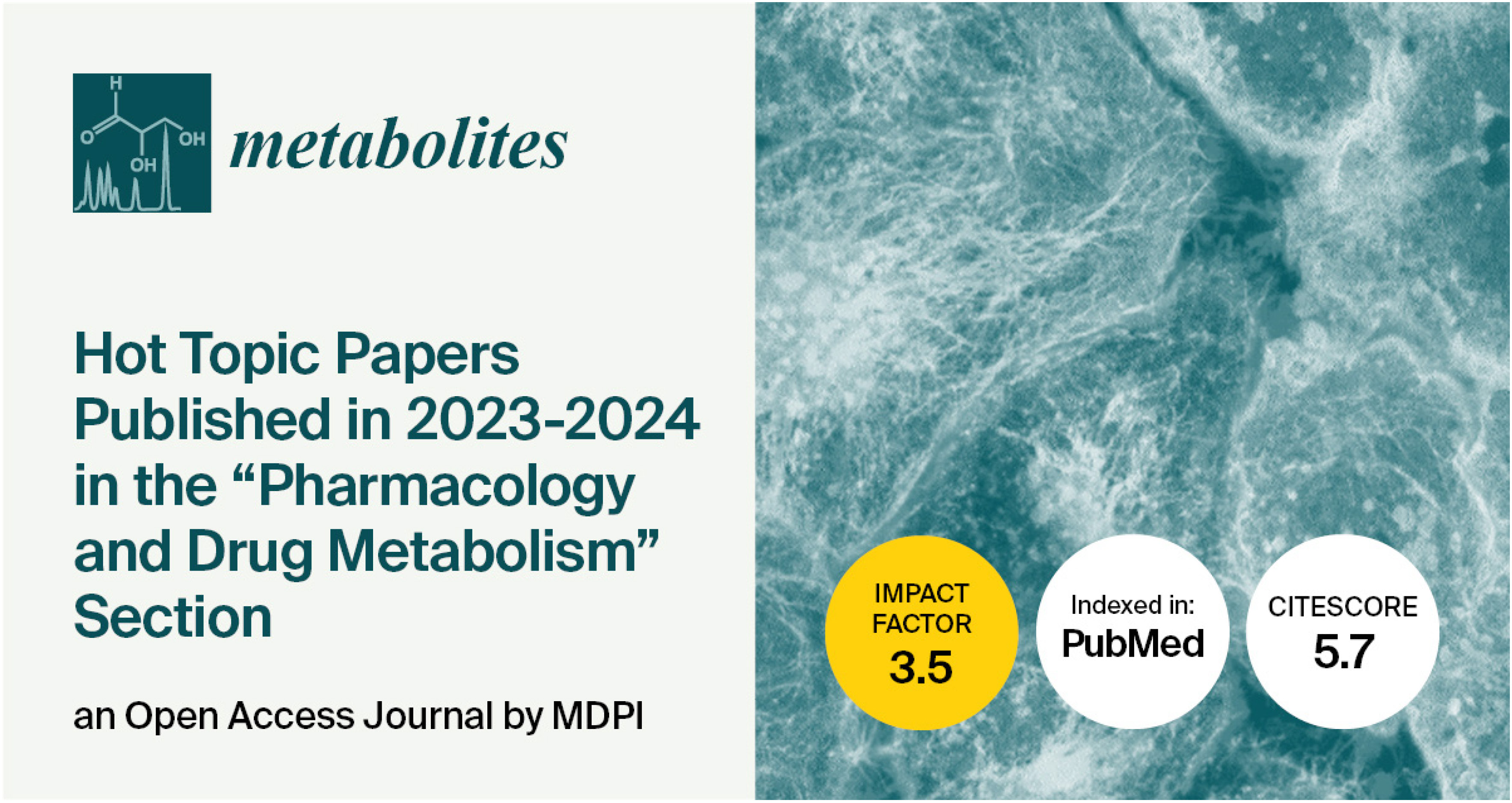
We are delighted to share some of the highly cited papers from the Section “Pharmacology and Drug Metabolism” that were published in Metabolites (ISSN: 2218-1989) in 2023 and 2024. In addition, some Special Issues related to this topic are currently open for submission.
The following is a list of articles and Special Issues that we believe will be interest of you:
1. “Links between Metabolic Syndrome and Hypertension: The Relationship with the Current Antidiabetic Drugs”
by Silviu Stanciu, Emilia Rusu, Daniela Miricescu, Ana Cristina Radu, Bianca Axinia, Ana Maria Vrabie, Ruxandra Ionescu, Mariana Jinga and Carmen Adella Sirbu
Metabolites 2023, 13(1), 87; https://doi.org/10.3390/metabo13010087
Available online: https://www.mdpi.com/2218-1989/13/1/87
2. “Understanding the Consequences of Fatty Bone and Fatty Muscle: How the Osteosarcopenic Adiposity Phenotype Uncovers the Deterioration of Body Composition”
by Kelsey Hu, Elizabeth Deya Edelen, Wenqing Zhuo, Aliya Khan, Josselyne Orbegoso, Lindsey Greenfield, Berna Rahi, Michael Griffin, Jasminka Z. Ilich and Owen J. Kelly
Metabolites 2023, 13(10), 1056; https://doi.org/10.3390/metabo13101056
Available online: https://www.mdpi.com/2218-1989/13/10/1056
3. “A Study of the Synergistic Effects of Essential Oils from Origanum compactum and Origanum elongatum with Commercial Antibiotics against Highly Prioritized Multidrug-Resistant Bacteria for the World Health Organization”
by Aziz Drioiche, Soukayna Baammi, Khalid Zibouh, Omkulthom Al Kamaly, Anwar M. Alnakhli, Firdaous Remok, Soukaina Saidi, Rachid Amaiach, Fadoua El Makhoukhi, Abdelhakim Elomri et al.
Metabolites 2024, 14(4), 210; https://doi.org/10.3390/metabo14040210
Available online: https://www.mdpi.com/2218-1989/14/4/210
4. “Pharmacokinetic and Pharmacodynamic Drug–Drug Interactions: Research Methods and Applications”
by Lei Sun, Kun Mi, Yixuan Hou, Tianyi Hui, Lan Zhang, Yanfei Tao, Zhenli Liu and Lingli Huang
Metabolites 2023, 13(8), 897; https://doi.org/10.3390/metabo13080897
Available online: https://www.mdpi.com/2218-1989/13/8/897
5. “Prediction of a Large-Scale Database of Collision Cross-Section and Retention Time Using Machine Learning to Reduce False Positive Annotations in Untargeted Metabolomics”
by Marie Lenski, Saïd Maallem, Gianni Zarcone, Guillaume Garçon, Jean-Marc Lo-Guidice, Sébastien Anthérieu and Delphine Allorge
Metabolites 2023, 13(2), 282; https://doi.org/10.3390/metabo13020282
Available online: https://www.mdpi.com/2218-1989/13/2/282
6. “Environment, Endocrine Disruptors, and Fatty Liver Disease Associated with Metabolic Dysfunction (MASLD)”
by Antonella Mosca, Melania Manco, Maria Rita Braghini, Stefano Cianfarani, Giuseppe Maggiore, Anna Alisi and Andrea Vania
Metabolites 2024, 14(1), 71; https://doi.org/10.3390/metabo14010071
Available online: https://www.mdpi.com/2218-1989/14/1/71
7. “Metabolites of Geum aleppicum and Sibbaldianthe bifurca: Diversity and α-Glucosidase Inhibitory Potential”
by Nina I. Kashchenko, Daniil N. Olennikov and Nadezhda K. Chirikova
Metabolites 2023, 13(6), 689; https://doi.org/10.3390/metabo13060689
Available online: https://www.mdpi.com/2218-1989/13/6/689
8. “Effects of Pregnancy on Plasma Sphingolipids Using a Metabolomic and Quantitative Analysis Approach”
by Luke F. Enthoven, Yuanyuan Shi, Emily Fay, Agnes Kim, Sue Moreni, Jennie Mao, Nina Isoherranen, Rheem A. Totah and Mary F. Hebert
Metabolites 2023, 13(9), 1026; https://doi.org/10.3390/metabo13091026
Available online: https://www.mdpi.com/2218-1989/13/9/1026
9. “Machine Learning to Predict Enzyme–Substrate Interactions in Elucidation of Synthesis Pathways: A Review”
by Luis F. Salas-Nuñez, Alvaro Barrera-Ocampo, Paola A. Caicedo, Natalie Cortes, Edison H. Osorio, Maria F. Villegas-Torres and Andres F. González Barrios
Metabolites 2024, 14(3), 154; https://doi.org/10.3390/metabo14030154
Available online: https://www.mdpi.com/2218-1989/14/3/154
10. “Integrative Multiomics Approach to Skin: The Sinergy between Individualised Medicine and Futuristic Precision Skin Care?”
by Angelica Dessì, Roberta Pintus, Vassilios Fanos and Alice Bosco
Metabolites 2024, 14(3), 157; https://doi.org/10.3390/metabo14030157
Available online: https://www.mdpi.com/2218-1989/14/3/157
Special Issues:
|
“The Comorbidity of Neurodegenerative and Metabolic Diseases”
|
“Metabolomics in Drug Metabolism, Drug-Drug Interactions, and Drug Toxicity”
|
|
“Drug Metabolism: Latest Advances and Prospects”
|
“Microalgae Bioactive Compounds with Therapeutical Properties”
|
|
“Toxicometabolomics for Metabotyping and Novel Mechanisms”
|
“Drug Metabolism and New Drug Development for Cancers”
|
19 May 2025
Metabolites | Selected Papers Published in 2023–2024 Related to NAFLD
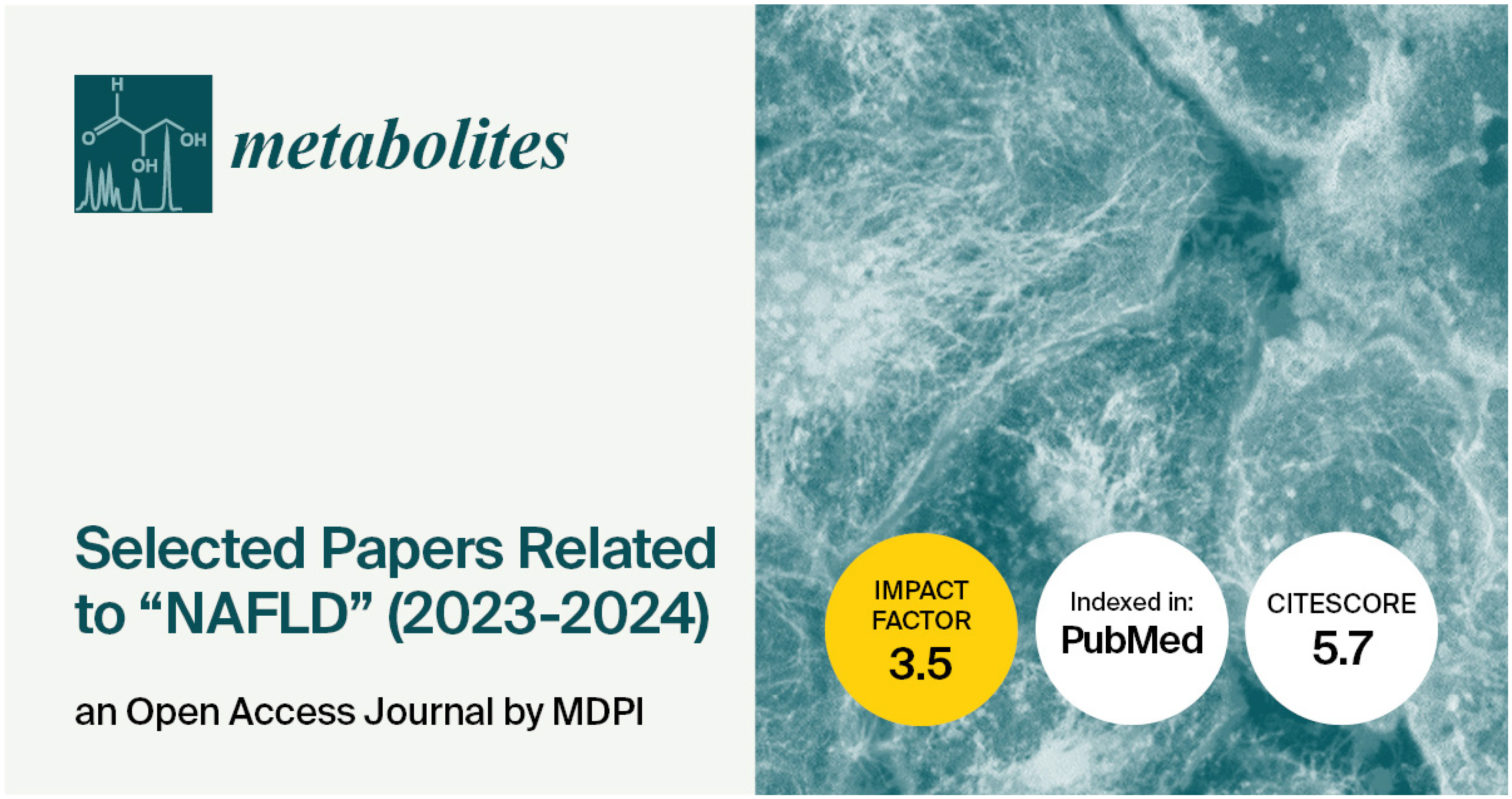
We are delighted to share some highly cited papers on NAFLD research that were published in our journal Metabolites (ISSN: 2218-1989) in 2023–2024. In addition, some Special Issues related to this topic are currently open for submission.
The following is a list of articles and Special Issues that we believe will be interest of you:
1. “Bilirubin Nanoparticle Treatment in Obese Mice Inhibits Hepatic Ceramide Production and Remodels Liver Fat Content”
by Zachary A. Kipp, Genesee J. Martinez, Evelyn A. Bates, Agil B. Maharramov, Robert M. Flight, Hunter N. B. Moseley, Andrew J. Morris, David E. Stec and Terry D. Hinds, Jr.
Metabolites 2023, 13(2), 215; https://doi.org/10.3390/metabo13020215
Available online: https://www.mdpi.com/2218-1989/13/2/215
2. “Metabolic Role of Autophagy in the Pathogenesis and Development of NAFLD”
by Lingxuan An, Ulrich Wirth, Dominik Koch, Malte Schirren, Moritz Drefs, Dionysios Koliogiannis, Hanno Niess, Joachim Andrassy, Markus Guba, Alexandr V. Bazhin et al.
Metabolites 2023, 13(1), 101; https://doi.org/10.3390/metabo13010101
Available online: https://www.mdpi.com/2218-1989/13/1/101
3. “Screening for NAFLD—Current Knowledge and Challenges”
by Roberta Forlano, Giordano Sigon, Benjamin H. Mullish, Michael Yee and Pinelopi Manousou
Metabolites 2023, 13(4), 536; https://doi.org/10.3390/metabo13040536
Available online: https://www.mdpi.com/2218-1989/13/4/536
4. “Glucagon-like Peptide-1 Receptor Agonists in Patients with Type 2 Diabetes Mellitus and Nonalcoholic Fatty Liver Disease—Current Background, Hopes, and Perspectives”
by Georgiana-Diana Cazac, Cristina-Mihaela Lăcătușu, Gabriela Ștefănescu, Cătălina Mihai, Elena-Daniela Grigorescu, Alina Onofriescu and Bogdan-Mircea Mihai
Metabolites 2023, 13(5), 581; https://doi.org/10.3390/metabo13050581
Available online: https://www.mdpi.com/2218-1989/13/5/581
5. “Plasma Metabolite Signatures in Male Carriers of Genetic Variants Associated with Non-Alcoholic Fatty Liver Disease”
by Lilian Fernandes Silva, Jagadish Vangipurapu, Anniina Oravilahti, Ville Männistö and Markku Laakso
Metabolites 2023, 13(2), 267; https://doi.org/10.3390/metabo13020267
Available online: https://www.mdpi.com/2218-1989/13/2/267
6. “Adipose Tissue Insulin Resistance in South Asian and Nordic Women after Gestational Diabetes Mellitus”
by Ahalya Anita Suntharalingam Kvist, Archana Sharma, Christine Sommer, Elisabeth Qvigstad, Hanne Løvdal Gulseth, Stina Therese Sollid, Ingrid Nermoen, Naveed Sattar, Jason Gill, Tone Møller Tannæs et al.
Metabolites 2024, 14(5), 288; https://doi.org/10.3390/metabo14050288
Available online: https://www.mdpi.com/2218-1989/14/5/288
7. “The Cellular Stability Hypothesis: Evidence of Ferroptosis and Accelerated Aging-Associated Diseases as Newly Identified Nutritional Pentadecanoic Acid (C15:0) Deficiency Syndrome”
by Stephanie Venn-Watson
Metabolites 2024, 14(7), 355; https://doi.org/10.3390/metabo14070355
Available online: https://www.mdpi.com/2218-1989/14/7/355
Special Issues:
|
“Liver Injury and Regeneration—Metabolic Research”
|
“Metabolomics in Human Diseases and Health”
|
|
“Metabolomics and MASLD: Pathways, Biomarkers, and Clinical Insights”
|
“Metabolic Dysregulation in Fatty Liver Disease”
|
19 May 2025
Metabolites | Selected Papers Published in 2023–2024 Related to Diet and Metabolism
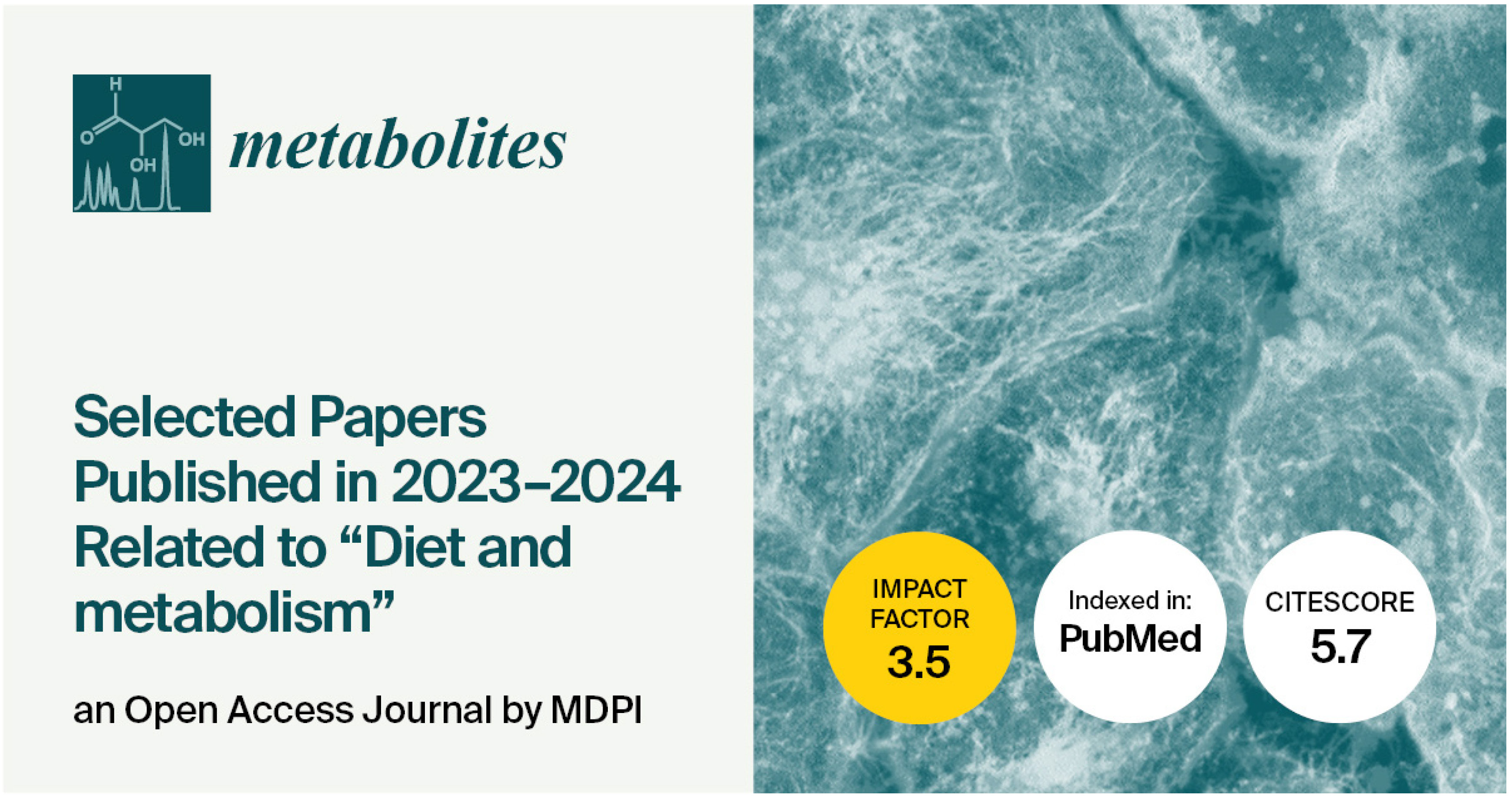
We are delighted to share some highly cited papers on diet and metabolism research that were published in our journal Metabolites (ISSN: 2218-1989) in 2023–2024.
1. “The Effect of a Gluten-Free Diet on Vitamin D Metabolism in Celiac Disease: The State of the Art”
by Michele Di Stefano, Emanuela Miceli, Caterina Mengoli, Gino Roberto Corazza and Antonio Di Sabatino
Metabolites 2023, 13(1), 74; https://doi.org/10.3390/metabo13010074
Available online: https://www.mdpi.com/2218-1989/13/1/74
2. “LC-QToF-Based Metabolomics Identifies Aberrant Tissue Metabolites Associated with a Higher-Fat Diet and Their ‘Reversion to Healthy’ with Dietary Probiotic Supplementation”
by Allyson Dailey, Gloria Solano-Aguilar, Joseph F. Urban and Robin D. Couch
Metabolites 2023, 13(3), 358; https://doi.org/10.3390/metabo13030358
Available online: https://www.mdpi.com/2218-1989/13/3/358
3. “Oral Administration of Chaetoceros gracilis—A Marine Microalga—Alleviates Hepatic Lipid Accumulation in Rats Fed a High-Sucrose and Cholesterol-Containing Diet”
by Bungo Shirouchi, Yuri Kawahara, Yuka Kutsuna, Mina Higuchi, Mai Okumura, Sarasa Mitsuta, Norio Nagao and Kazunari Tanaka
Metabolites 2023, 13(3), 436; https://doi.org/10.3390/metabo13030436
Available online: https://www.mdpi.com/2218-1989/13/3/436
4. “Mechanisms of Maternal Diet-Induced Obesity Affecting the Offspring Brain and Development of Affective Disorders”
by Daniel E. Radford-Smith and Daniel C. Anthony
Metabolites 2023, 13(3), 455; https://doi.org/10.3390/metabo13030455
Available online: https://www.mdpi.com/2218-1989/13/3/455
5. “High-Fat-Diet Suppressed Ketone Body Utilization for Lipogenic Pathway in Brown Adipose Tissues”
by Masahiro Yamasaki, Shinya Hasegawa, Shotaro Ozaki, Masahiko Imai, Daisuke Saito and Noriko Takahashi
Metabolites 2023, 13(4), 519; https://doi.org/10.3390/metabo13040519
Available online: https://www.mdpi.com/2218-1989/13/4/519
6. “Molecular Mechanisms of Western Diet-Induced Obesity and Obesity-Related Carcinogenesis—A Narrative Review”
by Dhruvi Lathigara, Devesh Kaushal and Robert Beaumont Wilson
Metabolites 2023, 13(5), 675; https://doi.org/10.3390/metabo13050675
Available online: https://www.mdpi.com/2218-1989/13/5/675
7. “Dietary Inflammatory and Insulinemic Potentials, Plasma Metabolome and Risk of Colorectal Cancer”
by Dong Hoon Lee, Qi Jin, Ni Shi, Fenglei Wang, Alaina M. Bever, Jun Li, Liming Liang, Frank B. Hu, Mingyang Song, Oana A. Zeleznik et al.
Metabolites 2023, 13(6), 744; https://doi.org/10.3390/metabo13060744
Available online: https://www.mdpi.com/2218-1989/13/6/744
8. “Bridging the Gap from Enterotypes to Personalized Dietary Recommendations: A Metabolomics Perspective on Microbiome Research”
by Madeline Bartsch, Andreas Hahn and Shoma Berkemeyer
Metabolites 2023, 13(12), 1182; https://doi.org/10.3390/metabo13121182
Available online: https://www.mdpi.com/2218-1989/13/12/1182
9. “Oreo Cookie Treatment Lowers LDL Cholesterol More Than High-Intensity Statin therapy in a Lean Mass Hyper-Responder on a Ketogenic Diet: A Curious Crossover Experiment”
by Nicholas G. Norwitz and William C. Cromwell
Metabolites 2024, 14(1), 73; https://doi.org/10.3390/metabo14010073
Available online: https://www.mdpi.com/2218-1989/14/1/73
10. “Long-Term Adherence to the Mediterranean Diet Reduces 20-Year Diabetes Incidence: The ATTICA Cohort Study (2002–2022)”
by Ioanna Kechagia, Thomas Tsiampalis, Evangelia Damigou, Fotios Barkas, Georgia Anastasiou, Evrydiki Kravvariti, Evangelos Liberopoulos, Petros P. Sfikakis, Christina Chrysohoou, Costas Tsioufis et al.
Metabolites 2024, 14(4), 182; https://doi.org/10.3390/metabo14040182
Available online: https://www.mdpi.com/2218-1989/14/4/182
11. “Can Daily Dietary Choices Have a Cardioprotective Effect? Food Compounds in the Prevention and Treatment of Cardiometabolic Diseases”
by Elżbieta Szczepańska, Barbara Janota, Marika Wlazło and Magdalena Gacal
Metabolites 2024, 14(6), 296; https://doi.org/10.3390/metabo14060296
Available online: https://www.mdpi.com/2218-1989/14/6/296
12. “Metabolomic and Physiological Effects of a Cardiorenal Protective Diet Intervention in African American Adults with Chronic Kidney Disease”
by Meera J. Patel, Chiamaka Emerenini, Xuan Wang, Teodoro Bottiglieri and Heather Kitzman
Metabolites 2024, 14(6), 300; https://doi.org/10.3390/metabo14060300
Available online: https://www.mdpi.com/2218-1989/14/6/300
13. “Changes in Serum Metabolome Following Low-Energy Diet-Induced Weight Loss in Women with Overweight and Prediabetes: A PREVIEW-New Zealand Sub-Study”
by Bárbara Relva, Linda M. Samuelsson, Iola F. Duarte, Ulrike Fasol, Patrick J. B. Edwards, Mikael Fogelholm, Anne Raben, Sally D. Poppitt and Marta P. Silvestre
Metabolites 2024, 14(8), 401; https://doi.org/10.3390/metabo14080401
Available online: https://www.mdpi.com/2218-1989/14/8/401
14. “Machine Learning-Based Plasma Metabolomics in Liraglutide-Treated Type 2 Diabetes Mellitus Patients and Diet-Induced Obese Mice”
by Seokjae Park and Eun-Kyoung Kim
Metabolites 2024, 14(9), 483; https://doi.org/10.3390/metabo14090483
Available online: https://www.mdpi.com/2218-1989/14/9/483
15. “Maternal Dietary Deficiencies in Folic Acid and Choline Change Metabolites Levels in Offspring after Ischemic Stroke”
by Faizan Anwar, Mary-Tyler Mosley, Paniz Jasbi, Jinhua Chi, Haiwei Gu and Nafisa M. Jadavji
Metabolites 2024, 14(10), 552; https://doi.org/10.3390/metabo14100552
Available online: https://www.mdpi.com/2218-1989/14/10/552
19 May 2025
Metabolites | Selected Papers Published in 2023–2024 Related to Salivary Metabolomics
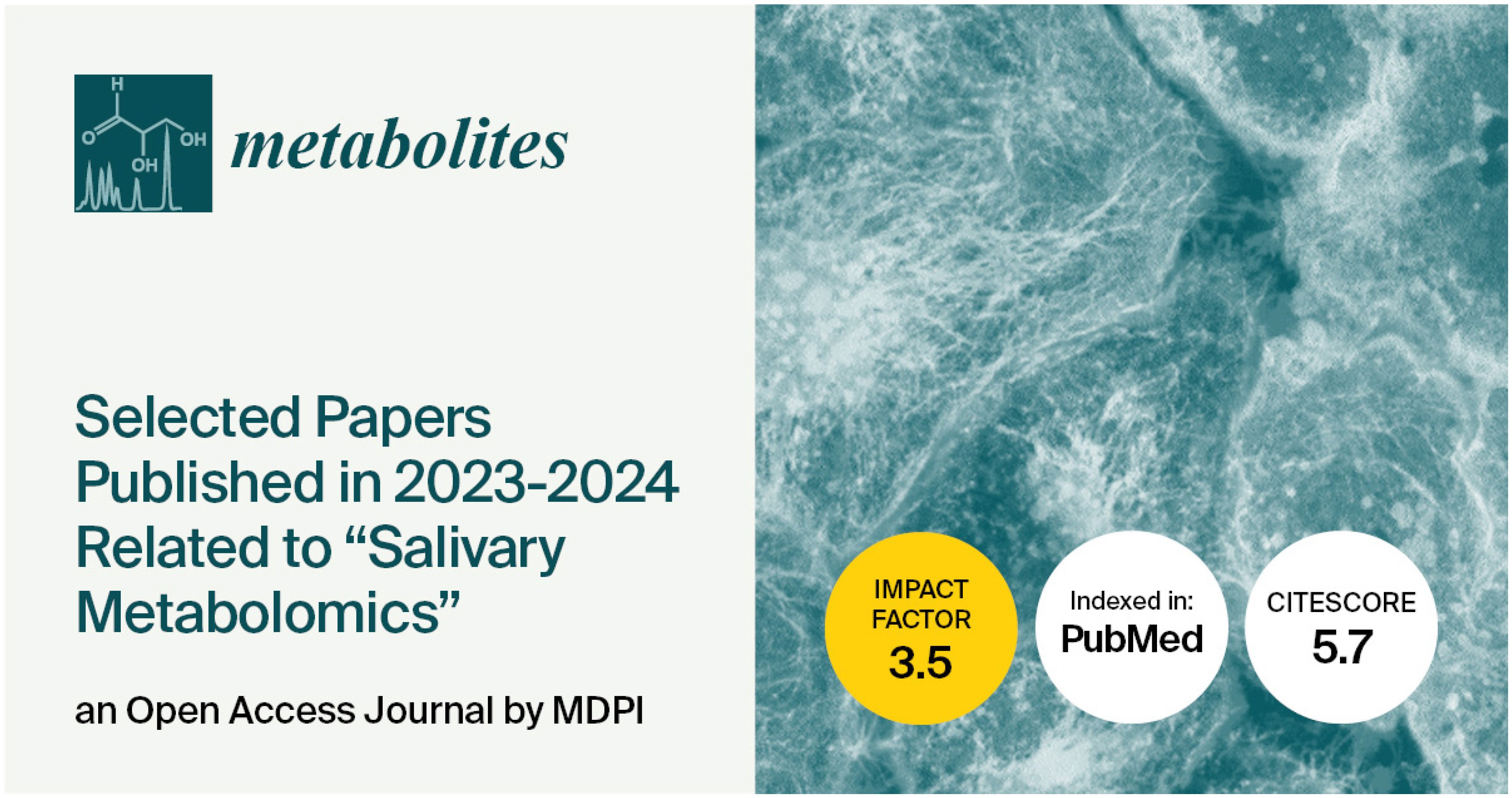
We are delighted to share some highly cited papers on salivary metabolomics research that were published 2023–2024 in our journal Metabolites (ISSN: 2218-1989).
1. “Salivary Antioxidant Capacity and Magnesium in Generalized Anxiety Disorder”
by Elena V. Proskurnina, Krystsina M. Liaukovich, Lyubov S. Bychkovskaya, Ivan V. Mikheev, Evgenia I. Alshanskaia, Mikhail A. Proskurnin, Olga V. Martynova and Galina V. Portnova
Metabolites 2023, 13(1), 73; https://doi.org/10.3390/metabo13010073
Available online: https://www.mdpi.com/2218-1989/13/1/73
2. “Qualitative and Quantitative Mass Spectrometry in Salivary Metabolomics and Proteomics”
by Paulina Grocholska, Marta Kowalska and Remigiusz Bąchor
Metabolites 2023, 13(2), 155; https://doi.org/10.3390/metabo13020155
Available online: https://www.mdpi.com/2218-1989/13/2/155
3. “Salivary Metabolomic Analysis Reveals Amino Acid Metabolism Shift in SARS-CoV-2 Virus Activity and Post-Infection Condition”
by Tatiana Kelly da Silva Fidalgo, Liana Bastos Freitas-Fernandes, Barbara Bruno Fagundes Marques, Caroline Souza de Araújo, Bruno Jefferson da Silva, Taísa Coelho Guimarães, Ricardo Guimarães Fischer, Eduardo Muniz Barretto Tinoco and Ana Paula Valente
Metabolites 2023, 13(2), 263; https://doi.org/10.3390/metabo13020263
Available online: https://www.mdpi.com/2218-1989/13/2/263
4. “Using LC-MS/MS to Determine Salivary Steroid Reference Intervals in a European Older Adult Population”
by Sarah Gregory, Scott G. Denham, Patricia Lee, Joanna P. Simpson and Natalie Z. M. Homer
Metabolites 2023, 13(2), 265; https://doi.org/10.3390/metabo13020265
Available online: https://www.mdpi.com/2218-1989/13/2/265
5. “Identification of a Biomarker Panel for Diagnosis of Early Childhood Caries Using Salivary Metabolic Profile”
by Seonghye Kim, Yuri Song, Seyeon Kim, Siyeong Kim, Heesam Na, Sujin Lee, Jin Chung and Suhkmann Kim
Metabolites 2023, 13(3), 356; https://doi.org/10.3390/metabo13030356
Available online: https://www.mdpi.com/2218-1989/13/3/356
6. “Metabolic Profile of Whole Unstimulated Saliva in Patients with Sjögren’s Syndrome”
by Giacomo Setti, Valeria Righi, Adele Mucci, Lucia Panari, Giuditta Bernardelli, Elisabetta Tarentini, Anna Gambini, Ugo Consolo, Luigi Generali, Cristina Magnoni et al.
Metabolites 2023, 13(3), 348; https://doi.org/10.3390/metabo13030348
Available online: https://www.mdpi.com/2218-1989/13/3/348
7. “Saliva Metabolomic Profile in Dental Medicine Research: A Narrative Review”
by Konstantinos Tzimas and Eftychia Pappa
Metabolites 2023, 13(3), 379; https://doi.org/10.3390/metabo13030379
Available online: https://www.mdpi.com/2218-1989/13/3/379
8. “Oral Sources of Salivary Metabolites”
by Eelis Hyvärinen, Bina Kashyap and Arja M. Kullaa
Metabolites 2023, 13(4), 498; https://doi.org/10.3390/metabo13040498
Available online: https://www.mdpi.com/2218-1989/13/4/498
9. “Saliva as Biomarker for Oral and Chronic Degenerative Non-Communicable Diseases”
by Michele Basilicata, Massimo Pieri, Giulia Marrone, Eleonora Nicolai, Manuela Di Lauro, Vincenza Paolino, Flaminia Tomassetti, Ilaria Vivarini, Patrizio Bollero, Sergio Bernardini et al.
Metabolites 2023, 13(8), 889; https://doi.org/10.3390/metabo13080889
Available online: https://www.mdpi.com/2218-1989/13/8/889
10. “Tear and Saliva Metabolomics in Evaporative Dry Eye Disease in Females”
by Fredrik A. Fineide, Behzod Tashbayev, Katja B. P. Elgstøen, Elise M. Sandås, Helge Rootwelt, Håvard Hynne, Xiangjun Chen, Sten Ræder, Jelle Vehof, Darlene Dartt et al.
Metabolites 2023, 13(11), 1125; https://doi.org/10.3390/metabo13111125
Available online: https://www.mdpi.com/2218-1989/13/11/1125
19 May 2025
Meet Us at the 43rd Annual Meeting of the European Society for Paediatric Infectious Diseases, 26–30 May 2025, Bucharest, Romania
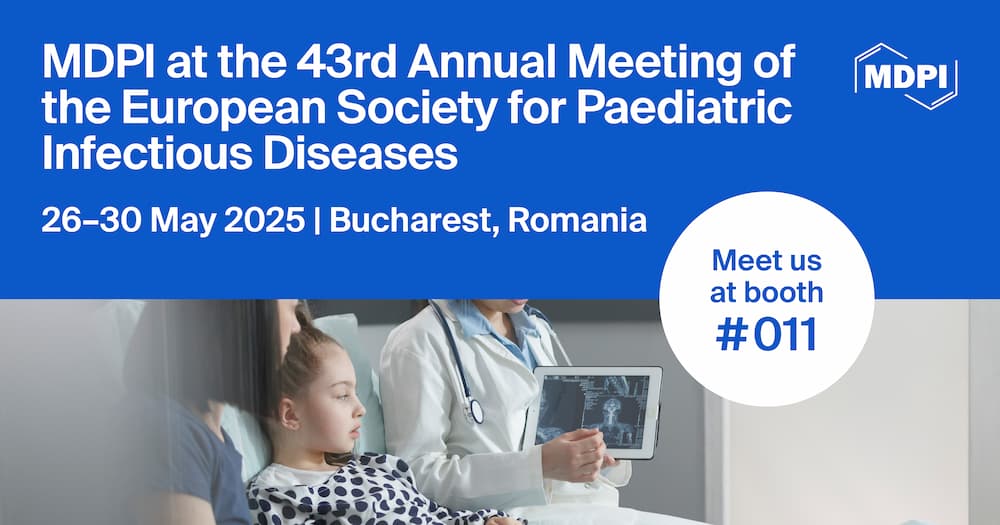
MDPI will be attending the 43rd Annual Meeting of the European Society for Paediatric Infectious Diseases, taking place from 26 to 30 May 2025 in Bucharest, Romania.
The 43rd Annual Meeting of the European Society for Paediatric Infectious Diseases will be held in person in Bucharest and online. This premier meeting brings together leading researchers and specialists from across Europe and beyond, all committed to advancing the study, treatment, and prevention of infectious diseases in children.
The following MDPI journals will be represented at the conference:
If you plan to attend the conference, we encourage you to visit our booth and speak to our representatives. We are eager to meet you in person and assist you with any queries that you may have.
For more information about the conference, please visit the official website at https://espidmeeting.org/.
13 May 2025
Empowering Academic Growth with MDPI: A Scientific Publishing Exchange at Toronto Metropolitan University, 15 May 2025

MDPI is excited to collaborate with Toronto Metropolitan University to host an engaging Scientific Publishing Workshop aimed at empowering scholars with the knowledge and tools needed to succeed in academic publishing. This workshop will delve into the key aspects of MDPI’s open access publishing framework, offering an in-depth exploration of journal selection, the editorial workflow, and the essentials of publication ethics. Participants will also gain practical advice on improving their scientific writing and effectively addressing reviewer comments, with guidance from an experienced professional. This session promises to equip attendees with valuable skills to elevate their publishing journey.
Workshop Highlights:
- Learn How to Better Write and Structure a Research Article;
- How to Choose Where to Publish Academic Work;
- How to Respond to Reviewer Comments;
- Reasons for Rejection During Pre-Check;
- How to Navigate Through Ethics and AI Use.
Date: 15 May 2025
Time: 12:00–1:30 p.m.
Venue: Toronto Metropolitan University
Program:
|
Speakers |
Program and Content |
Time |
|
Dr. Stephen Mora |
Introduction to MDPI |
12:00–12:05 p.m. |
|
|
How to Write and Structure a Research Article |
12:05–12:45 p.m. |
|
|
How to Respond to Reviewer Comments |
12:45–1:30 p.m. |

6 May 2025
Meet Us at the Chinese Society of Plant Physiology and Plant Molecular Biology 2025 Annual Meeting, 28 July–1 August 2025, Heilongjiang, China
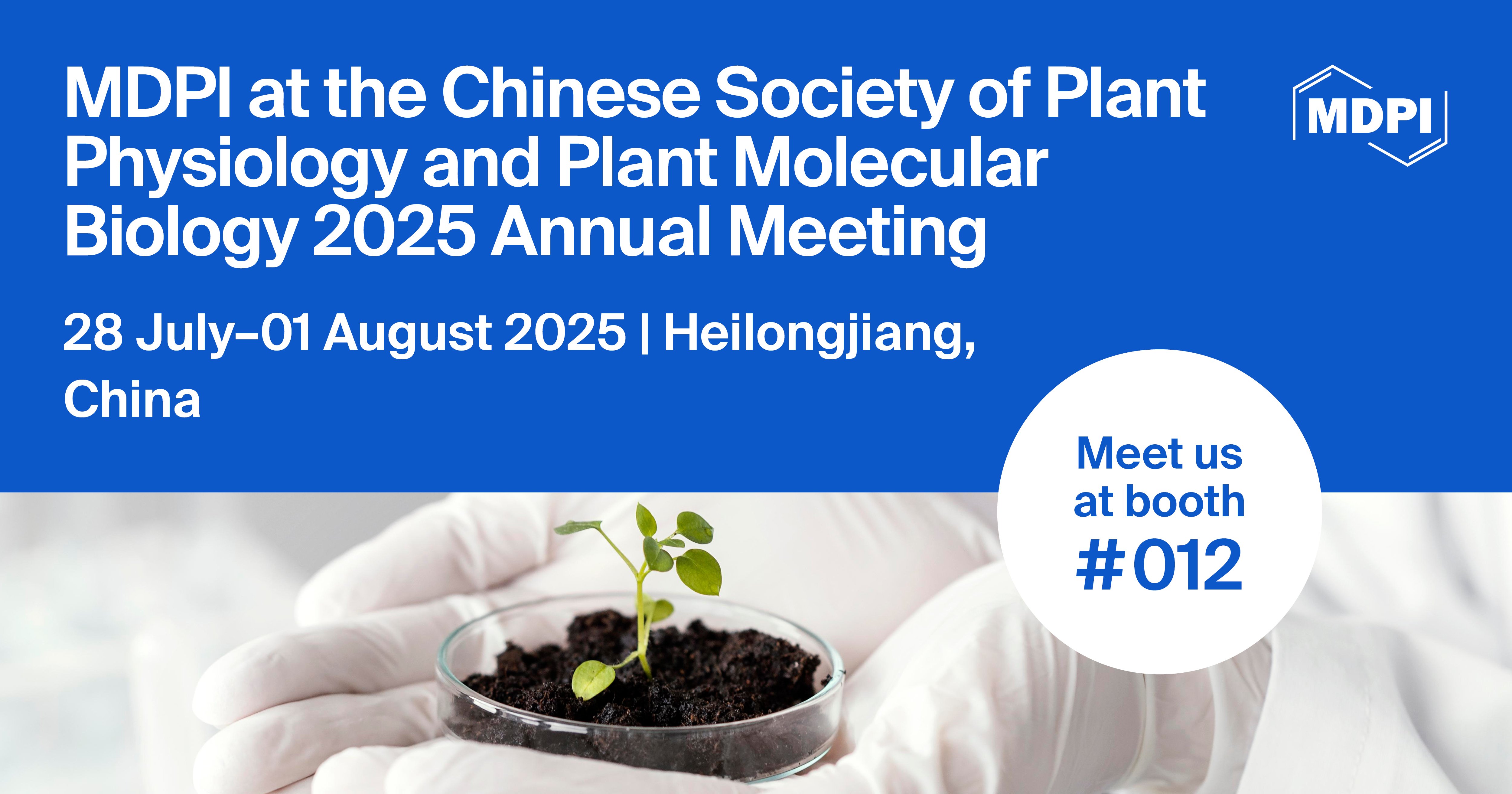
Conference: Chinese Society of Plant Physiology and Plant Molecular Biology 2025 Annual Meeting
Organization: Chinese Society of Plant Biology
Date: 28 July–01 August 2025
Place: Heilongjiang, China
MDPI journals will be present as exhibitors at the Chinese Society of Plant Physiology and Plant Molecular Biology 2025 Annual Meeting, which will be held at the Sheraton Harbin Xiangfang Hotel, Heilongjiang, China, from 28 July to 1 August 2025.
This conference will cover the following topics:
- Plant metabolism and nutritional health;
- Plant development and cell fate;
- Plant carbon sink and physiological ecology;
- Phytoremediation biology and sustainable agriculture;
- Plant adversity perception and trait plasticity;
- Plant–microbe symbiosis and nutrition;
- Crop molecular design breeding;
- Plant–biotic interactions and crop disease and pest resistance;
- Plant epigenetics;
- Interdisciplinary forum;
- Young scholars forum;
- Youth forum on natural product biosynthesis;
- Young scholars’ growth and journal development forum.
The following MDPI journals will be represented:
- Plants;
- Current Issues in Molecular Biology (CIMB);
- Agriculture;
- International Journal of Molecular Sciences (IJMS);
- Horticulturae;
- Agronomy;
- International Journal of Plant Biology (IJPB);
- Epigenomes;
- Cells;
- BioTech;
- Phycology;
- Metabolites;
- Microorganisms;
- Methods and Protocols.
If you will be attending this conference, please feel free to visit our booth. Our delegates look forward to meeting you in person and answering any questions that you may have.
30 April 2025
MDPI INSIGHTS: The CEO's Letter #22 - 300 Journals in WoS, Norway & Sweden Consortiums, Self-citations

Welcome to the MDPI Insights: The CEO's Letter.
In these monthly letters, I will showcase two key aspects of our work at MDPI: our commitment to empowering researchers and our determination to facilitating open scientific exchange.
Opening Thoughts

Over 300 MDPI Journals are Indexed in Web of Science
Indexing is essential to scholarly publishing as it promotes visibility and the impact of research. I’m excited to share that MDPI now has over 300 journals indexed in the Web of Science (WoS). This milestone reflects the work of our authors, editors, reviewers, and the entire MDPI staff, contributing to greater visibility and impact for open access research.
Publish with MDPI, publish with impact.
Having over 300 MDPI journals indexed in the Web of Science is more than a numbers game. It represents a recognition of the quality, consistency, and relevance of the research published in our journals. For the academic community, it reflects the growing trust in MDPI as a reputable publisher, leading the way in open access publishing.
A closer look at the achievement
Being indexed in the WoS nvolves meeting a list of quality criteria, including 24 quality benchmarks for ESCI journals.
For MDPI, rigorous editorial standards and scientific integrity are key. These enabled over 300 journals to pass the Web of Science quality criteria for indexing.
Here we share a blog post discussing the importance of this milestone for MDPI and open scholarly research. In this post, Constanze Schelhorn, Head of Indexing, at MDPI, and Giulia Stefenelli, Scientific Communications Lead, share their thoughts and insights on what this achievement means for our commitment to high-quality research.
“MDPI has a well-structured quality assurance framework that applies to all our journals. We also apply clear, standardized peer-review policies across our portfolio, ensuring transparency and consistency.” – Constanze Schelhorn, Head of Indexing
“This achievement is a step forward for Open Access research, reinforcing the mission to share scientific knowledge globally and facilitate research progress.” – Giulia Stefenelli, Scientific Communications Lead
Read the blog here: https://blog.mdpi.com/2025/04/03/300-mdpi-journals/
Looking to the future
This milestone is a testament to MDPI’s dedication to peer review, editorial excellence, and innovation in academic publishing. It highlights our role as leaders in open access publishing.
Personally, I see this as just the beginning. We will continue to support researchers, expand our contributions to scholarly communication, and push the boundaries of academic publishing.
Impactful Research

Nearly 920 partner institutions in MDPI’s Institutional Open Access Program
I’m pleased to share some exciting progress from MDPI's Institutional Open Access Program (IOAP), which now includes nearly 920 partner institutions worldwide. This is more than just a number. It reflects the growing trust and collaboration we’ve built with universities, libraries, and research organizations across the globe.
The IOAP offers institutions discounted Article Processing Charges (APCs), access to a dedicated institutional dashboard, and transparency throughout the publishing process.
Norway’s Sikt Consortium Renews national agreement with MDPI
MDPI has renewed its national agreement with the Sikt Consortium, which now supports 36 institutions across Norway. New partners, such as Kristiania University of Applied Sciences, join long-standing collaborators such as NTNU, the University of Bergen, and UiT, The Arctic University of Norway. The agreement promotes affordable, high-quality open access publishing through centralized APC funding, and reinforces Norway’s leadership in open science.

These agreements reflect MDPI’s mission to remove barriers to scientific publishing and make research freely available to all. By collaborating with national consortia and institutions, we advance the open access and strengthen our global network and collaborations.
Our IOAP Team
A big thank-you to our IOAP team for driving these important collaborations. Their work includes increasing MDPI’s visibility in scholarly communications, strengthening relationships with IOAP partners, and building trust with key stakeholders.
These efforts not only help researchers to publish their work openly and affordably but also reinforce MDPI’s position as a trusted leader in open access.
What are the benefits of MDPI’s IOAP?
For Authors: Researchers affiliated with IOAP partner institutions benefit from automatic discounts on APCs, Book Processing Charges (BPCs), JAMS, and Author Services across MDPI’s journals. The process is seamless as there is no need for codes or special applications. The publishing experience is smoother and more affordable, and centralized invoicing helps simplify the process, allowing authors to focus on their research rather than administration.
For Libraries: Participating libraries receive access to a dedicated institutional dashboard with live metadata on submissions from affiliated authors, past and present. They also benefit from flexible invoicing options (direct, collective, or prepayment) to help streamline administration, while clear, transparent agreements ensure that there are no hidden clauses or small print. Automated deposits into Institutional Repositories further reduce manual work, supporting libraries in their mission to advance open access and serve their research communities.
Inside MDPI

MDPI Self-citation study shows industry alignment
Earlier this month, Dr. Giulia Stefenelli and Dr. Enric Sayas published a thoughtful and transparent article on the ALPSP blog, presenting a self-citation analysis across MDPI’s 237 journals indexed in the Journal Citation Reports (JCR).
They found that MDPI's average self-citation rate in 2024 was 14.85%, well within industry norms and ranking 6th among the top ten publishers. Only 2.3% of MDPI journals were identified as outliers with high self-citation rates, compared to 4.7% among other leading publishers. An alternative approach, using weighted average by publication volume, shows MDPI’s self-citation rate rises from 14% to 19.7%, shifting our rank from 6th to 3rd. The study also shows that the impact of self-citation on journal quartile placement is minimal.
Read the full article on the ALPSP blog: https://blog.alpsp.org/2025/03/mdpi-self-citations-study-highlights.html
Why is this important?
As explained in the full article, the results “reinforce the fact that self-citations have minimal influence on MDPI journal rankings, emphasizing the integrity of editorial practices and the absence of any deliberate efforts to manipulate impact.”
Self-citation is a hot topic, and MDPI is sometimes unfairly singled out in this area. This analysis helps put some perspective to that narrative.
At MDPI, we are committed to transparency and to using data-driven insights to address common misconceptions about open access publishing. Our focus on self-citation reflects this commitment, and we plan to extend our efforts to other areas where the Gold OA model is often misunderstood.
About the authors

Dr. Giulia Stefenelli, Scientific Communications Lead, leverages her expertise in science communication, editorial processes, and Open Access (OA) promotion to address both institutional and country-specific challenges. She collaborates with teams across PR, Editorial Procedures, Institutional Partnerships, Research Integrity, AI and more, developing strategies to engage stakeholders, including policymakers, academics, and industry leaders. Her responsibilities include enhancing MDPI’s scientific network and promoting OA initiatives at events worldwide, supporting the efforts of various departments, and ensuring effective communication to both specialist and broader audiences.

Dr. Enric Sayas is a Business Analyst specializing in the integration of AI and Machine Learning in scientific publishing.
Within MDPI’s AI team, Enric combines his editorial expertise with his passion for AI to support the development of AI-driven solutions tailored to editorial needs, enhancing efficiency and improving decision-making.
Enric’s interests extend to data science methodologies applied to scientific publishing, as well as the broader impact of AI on open science, peer review, and the future of scientific publishing.
Coming Together for Science

Plants 2025: From Seeds to Food Security

Prof. Dr. Dilantha Fernando presenting at Plants 2025 in Barcelona, Spain.
The MDPI Conference Plants 2025: From Seeds to Food Security took place in Barcelona, Spain, from 31 March to 2 April 2025.
It was chaired by Editor-in-Chief of MDPI journal Plants (Q1 journal); Prof. Dr. Dilantha Fernando from the University of Manitoba, in Canada, and Section Editor-in-Chief of Plants; Dr. Fermín Morales from Instituto de Agrobiotecnología (IdAB) – CSIC, in Spain; and Prof. Dr. Oscar Vicente from Universitat Politècnica de València (UPV) in Spain.
The conference brought plant scientists together to discuss innovations in sustainable agriculture, crop improvement, and environmental conservation.
With the global population projected to reach 9.7 billion by 2050, the conference addressed key challenges such as food security, climate change, and sustainable agroecosystems through keynote talks and seven specialized sessions.
The conference gathered 111 attendees from 36 different countries, featuring 1 keynote speaker, 9 invited speakers, and 41 selected talks, along with 56 posters. The event received just over 200 submissions and 102 accepted abstracts.

From insightful talks, engaging poster sessions and engaging networking moments, Plants 2025 was a special experience. You can relive the highlights from the Plants 2025 conference here with our after movie!
Awards
Four awards were presented at the conclusion of the conference, sponsored by the journal Plants: two Best Poster Awards (€250 each) and two Best Oral Presentation Awards (€300 each).
Plants 2025 Conference Team
The Plants 2025 Conference was organized by colleagues from MDPI’s Conference Team: Ana Sanchis (Conference Manager), Cédric Spinnler (Senior Conference Organizer), Raquel Sellès (Conference Organizer) and Laura Perez (Conference Assistant).

Upcoming event

5–7 May 2025
The 2nd International Electronic Conference on Metals
Location: Online event (Central European Summer Time)
As one of the pillar technologies that support the development of modern society and metallurgy, IECME 2025 will present the state-of-the-art of Metallurgy and Metals.
Find more upcoming MDPI events here.
Closing Thoughts

Swedish consortium renews partnership with MDPI
I’m pleased to share that MDPI has renewed its national partnership with Sweden’s Bibsam Consortium. This is a continued commitment to advancing open access publishing and supporting Sweden’s vision for fully open research.
Under this renewed agreement, 22 leading institutions including KTH Royal Institute of Technology, Stockholm University, Linnaeus University, and Linköping University, will continue to benefit from MDPI’s IOAP. This provides discounts on APCs and a more streamlined, researcher-friendly publishing experience.
MDPI and Bibsam renew national agreement for Sweden

“With robust backing from national open science guidelines, Sweden’s open-access landscape is rapidly advancing,” says Becky Castellon, institutional partnerships manager at MDPI.
“In fact, fewer than 15% of all Swedish research outputs were locked behind paywalls in 2023. We are passionate about the positive impact our ongoing partnership with the Bibsam Consortium will have on Swedish research, paving the way for ground-breaking developments and a more inclusive, open scientific community. Through flexible solutions and tailored policies, we enable institutions to prioritize research, foster innovation, and enhance accessibility, driving the shift to full open access.”
Recent MDPI IOAP Consortium signings from 2025:
- The UK’s Jisc Consortium extended its national agreement, continuing support for more than 60 institutions across the UK.
- Switzerland’s CSAL (Consortium of Swiss Academic Libraries) renewed its agreement, continuing our collaboration with top institutions such as ETH Zurich and EPFL Lausanne.
- In Germany, we signed a new national agreement with ZB MED that includes over 100 universities and research institutions, with 78 institutions joining under a central or flat-fee model to simplify APC coverage.
Chief Executive Officer
MDPI AG






















